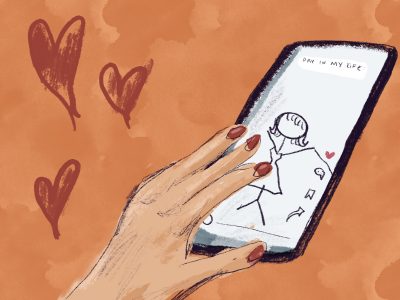It’s about time we reexamine the way we involve ourselves in celebrity.

On Dec. 3, an X user replied to a message about Taylor Swift and Travis Kelce: “Last night I just sat and thought about the fact that he left KC yesterday to go to Lambeau, and she stayed in their house. Alone. Not just because he’s there, but because it’s her place, too, now. She’s probably decorating for Christmas. It made me so happy.”
Seemingly invasive posts and messages such as this one are not uncommon, especially considering the level of stardom the two possess. Content such as this post is demonstrative of the increasing phenomenon that is parasocial relationships.
Parasocial relationships are defined as imagined social relationships and interactions with people who are distant from us and who do not reciprocate individual communication or interest.
Overinvolvement in celebrities and their lives is nothing new — tabloids and paparazzi have existed for decades — but the presence of the phenomenon has been amplified by easy and widespread access to the internet and social media platforms.
The pop culture and music worlds thrive off “fangirls.” However, there are lines to be crossed. Because of the internet and access to celebrity news, people have seemed to forget boundaries exist, making for some somewhat creepy rhetoric such as the content we see about Swift.
Talking about celebrity gossip is one thing — but feeling as though you have a right to their private business or speaking about them publicly if you are close friends is something entirely different. Speculation and claims about celebrities that we know in no personal capacity can easily reach harmful territory.
The phenomenon can apply not just to extreme fans of certain celebrities but also their haters — and parasocial relationships can make the line between the two very fine.
After English actor Kit Connor was spotted out holding hands with his female co-star Maia Reficco in September 2022, internet users dug into his history of personal relationships.
The actor was accused of “queerbaiting” because he portrayed a bisexual character on the show “Heartstopper,” though he was presumed to be heterosexual because of his photographs with Reficco.
The claims put so much pressure on the star that he was forced to take a break from Twitter. He returned later in the year to say, “Back for a minute. I’m bi. Congrats for forcing an 18 year old to out himself. I think some of you missed the point of the show. Bye.”
Parasocial relationships and online celeb culture isn’t just a world of fun speculation. It’s a real-life phenomenon with real-life implications, often harmful and damaging ones, such as what Connor went through last year.
For years, comedian John Mulaney had talked both extensively and highly about his wife, so many fans of his felt as though they knew the ins and outs of their whole marriage.
When their divorce was announced, people began to take sides. Many fans took to social media to vent about their personal sadness surrounding the news, and even went as far as to talk about who would gain custody of their dog. After the subsequent news of his relationship with Olivia Munn, he started getting a lot of hate and was accused of cheating.
The internet has given anybody the platform to not just comment on celebrity culture, but act as if we are owed a personal look into their lives.
In a way, the rise of damage from parasocial relationships and invasive fans makes sense — social media makes interactions between celebrities and their fans common, and access to online gossip or news is at consumers’ fingertips.
But it should be a public figure’s choice whether they share certain information about themselves or not. Something participants in parasocial relationships often lack is the realization that, just because celebrities are famous and have their lives on blast, it doesn’t make it okay for them to be treated as if they are best friends with their fans.
Famous people do not owe us information about their lives, and their celebrity status does not automatically mean fans deserve access.
















































































































